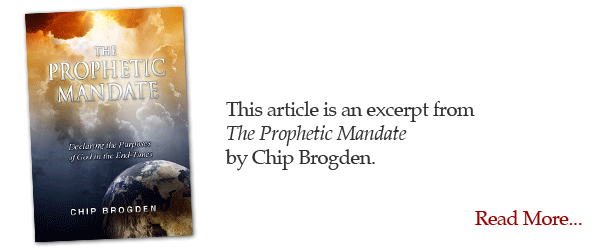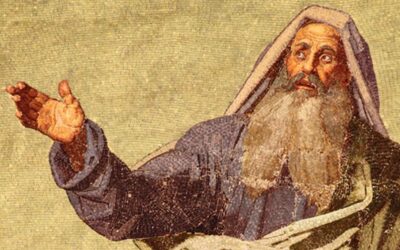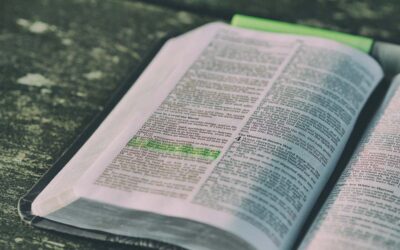Those in the Western world have very little experience with fasting, whereas those in the Eastern world are very experienced. Fasting is not limited to Christians only; most religious people in the East observe some kind of fasting, regardless of their faith.
That Jesus intends for His disciples to fast is made clear by the words, “When you fast…” If it were a matter of personal preference the Lord would have said, “IF you fast.” The word WHEN implies that there will be times when a disciple of the Lord is called into a time of fasting. It seems to be a foregone conclusion. Fasting is as much a part of a disciple’s life as prayer; hence the Lord couples, “When you pray” with “when you fast” in His teaching to the disciples.
We can account for the lack of specific direction in the Bible about HOW to fast by reiterating again that fasting was and is commonly practiced in the East, and people knew how to do it. Some practical advice along these lines may be helpful to those who are not as experienced but sense the Lord is quickening them to seek His face with prayer and with fasting.
First, let us establish the history of fasting in the Bible and its validity upon the Church today.
Biblical Examples of Fasting
The most notable examples of fasting are found in the lives of the prophets. The prophetic ministry is inescapably linked to fasting. Moses fasted for forty days on two separate occasions (Deuteronomy 9:9,19). Elijah fasted for forty days in the wilderness (I Kings 19:8). Jesus also fasted for forty days (Luke 4:2). Daniel fasted on several occasions, and he gives us the most insight into different ways to fast (Daniel 1:8; 9:3; 10:2,3). Esther asked the Jews to fast for her by going without food or drink for three days (Esther 4:16). David frequently fasted as a way to show sorrow for his sins (II Samuel 12:16-20; 69:10; 109:24). Ezra and Nehemiah were both men of fasting and prayer (Ezra 8:21; Nehemiah 1:4). The Jews observed regular fasts as part of the Law of Moses, and fasting seemed to be the rallying cry for all Israel whenever a time of great crisis was at hand (Joel 1:13,14).
Even wicked king Ahab was granted some grace from God because he humbled himself with prayer and fasting (I Kings 21:25-29). So fasting is not limited to saints and holy people. Nineveh was the capital of Assyria, one of the first world powers, and a pagan society. Yet when Jonah preached that Nineveh would be destroyed in forty days, the response was uncharacteristic and surprising:
“…the people of Nineveh believed God, and proclaimed a fast, and put on sackcloth, from the greatest of them even to the least of them. For word came unto the king of Nineveh, and he arose form his throne, and he laid his robe from him, and covered him with sackcloth, and sat in ashes. And he caused it to be proclaimed and published through Nineveh by saying, ‘Let neither man nor beast, herd nor flock, taste any thing: let them not feed, nor drink water: But let man and beast be covered with sackcloth, and cry mightily unto God: yea, let them turn every one from his evil way, and from the violence that is in their hands. Who can tell if God will turn and repent, and turn away from His fierce anger, that we perish not?’ And God saw their works, that they turned from their evil way; and God repented of the evil, that He had said that He would do unto them and He did it not” (Jonah 3:5-10).
It is noteworthy that the Assyrians would not even allow their animals to eat or drink during this time of national repentance. We have yet to see the likes of this anywhere else in the world.
Fasting is not limited to the Old Testament. Scripture tells us that Anna never departed the Temple, but ministered to the Lord with prayer and fasting day and night (Luke 2:37). John the Baptist and his disciples observed fasting, as did the Pharisees (Matthew 9:14). Jesus indicated that once He returned to heaven, His disciples would fast as well (Matthew 9:15).
And so they did. Because Cornelius fasted and prayed, the Gospel was first preached to the Gentiles in his home, establishing that Christ was not the Savior for Jews only, but for the whole world (Acts 10:30). Fasting and prayer launched the first missionary journey of Paul which would turn the whole world upside down (Acts 13:2,3). The apostles fasted and prayed each time they confirmed elders in the new churches they established (Acts 14:23). Paul recommended that husbands and wives occasionally abstain from sexual relations, by consent, for the purpose of fasting and prayer (I Corinthians 7:5). He fasted often himself (II Corinthians 6:5; 11:27).
The Purpose of Fasting
If we will take the time to read through the Scriptures cited above we will find four primary reasons for fasting. It is time to fast when:
1. We want to minister to the Lord (Anna, the Antiochian believers);
2. We want to show personal contrition and sorrow for our sins (David, Nineveh, Ahab) or for the sins of others (Daniel, Nehemiah, Ezra);
3. We need revelation concerning the present and direction concerning the future (Daniel, Cornelius, the apostles);
4. We experience times of great spiritual crisis and conflict (Jesus, Moses, Elijah, Daniel, Esther, Paul).
Our study of the above examples also show four kinds of fasting. They include:
1. THE SUPERNATURAL FAST – going beyond the limits of human endurance by the direct hand of God, such as Moses’ forty day fast in which he did not eat or drink. Humanly speaking, a man cannot survive without water for longer than three or four days. This was a supernatural fast, and is not likely to be repeated.
2. THE TOTAL FAST – going without food or water, such as Esther’s fast and Nineveh’s fast. Desperate times call for desperate measures, and the pending destruction of an entire nation or city would call for this kind of fast. It should never be attempted for longer than three days, and only if the Lord’s direction is unmistakably clear.
3. THE NORMAL FAST – going without food, but drinking liquids. This is the traditional and most common form of fasting, and is the kind of fast Jesus observed in the wilderness. We know this because the Bible says He was hungry, but it does not say He was thirsty (Luke 4:2). A normal fast will be of varying length, anywhere from one meal, to one day, three days, seven days, or even twenty-one days, but it will never exceed forty days.
4. THE PARTIAL FAST – observing a special diet, but not necessarily abstaining from all food. Daniel was a master of this particular kind of fast, and it is preferable for those who cannot totally go without food for health or other reasons. Daniel observed this kind of fast when he refused meat and wine and asked for pulse (a kind of vegetable stew) and water. On another occasion he observed the same fast and also abstained from “pleasant bread”, which may have been something like cake or some delicacy. It is a known fact that Charles Wesley fasted by eating only bread and water. A partial fast may also include going without breakfast for several days in succession, or eating only one meal a day. The possibilities for this kind of fast are endless, and it is a good place for the novice to begin.
Preparing to Fast
It is better to live a life of continual fasting and prayer than it is to suddenly find yourself in a situation which calls for fasting and be totally unprepared to deny yourself. We can and should live, eat, and drink modestly at all times. If we are used to eating all we want then it will be very difficult to respond to the Lord when He desires us to seek His face with fasting. So we should be on the alert, constantly watching and praying, so that we are ready to respond immediately to the circumstances that are presented to us. It may be that we have no time to prepare at all, but the situation is so urgent that we drop everything immediately when a word like Jonah’s is brought to our attention. We should conduct ourselves in such a manner that we are ready at a moment’s notice should the Lord require us.
Then again, you may sense that the Lord is calling you to fast and pray but the timing is left up to you as to when to begin. Suppose, for instance, that the Lord lays upon my heart that I should make preparations to fast and pray. As I respond to this leading I will want to seek direction from the Lord as to what kind of fast to observe and the duration of it. The longer and more intense the kind of fast we are led to observe, the more we should prepare. I will want to arrange my schedule accordingly so as to allow for extra time in prayer. I will also want to begin eating less in anticipation of the fast. This will make the transition easier. To gorge oneself the day before the fast defeats the purpose. I will also want to make my wife aware of my plans so she can schedule things accordingly. Otherwise, it is a secret between myself and the Lord. So these are some of the things to be considered.
In addition, if you are pregnant, or have a medical condition such as diabetes or an eating disorder, it would be wise to consult your doctor before undertaking any kind of change in diet. It would be appropriate to tell your doctor that you want to fast for religious purposes and ask for his or her advice before commencing.
The body adjusts to fasting by degrees. For that reason, it is foolish to begin with a forty day fast if you have never even fasted longer than one day. It is better to begin slowly. As you are faithful with a few small fasts, larger fasts will come. Since our praying and fasting is to be done in secret, there is nothing to be gained by attempting a long fast for which we are spiritually and physically unprepared.
There should be some clear indication or reason why you are fasting. We are not commanded to observe certain days or months in which we are to fast. So the only valid reason to initiate a fast is when one senses the leading of the Lord to do so in response to one of the four situations listed previously. There are medicinal benefits of fasting, but I would say if you are fasting for medicinal benefits or for weight-loss then you are not fasting unto the Lord. We are out to benefit His Kingdom, not ourselves. Thus, we should know the purpose of our fast before we begin so that our prayers and intercessions will be centered around that purpose. We are not trying to put the Lord into a box, but we do stress that a definite aim and a particular outcome should be expected. We cannot fast until the whole world is saved: this is neither definite, nor is it reasonable. We cannot even fast until a particular person is saved, let alone a nation, because we cannot control other people with our prayers. Fasting will not change God, and it will not change others, but it will change US. So, we may fast for specific answers to prayer, such as revelation, direction, forgiveness of sins, etc. We need specificity in order to gauge the effectiveness of our efforts. Once we have the answer we seek, our fasting has served its purpose.
While You Are Fasting
There are huge blocks of time that become available to those who fast. We are able to redeem several minutes, sometimes hours a day, when we do not eat. In the first place, much time is spent thinking about food, shopping for food, preparing meals, eating them, and cleaning up afterwards. If we fast from three meals we can usually invest two or three hours of extra time into prayer, or study of the Word. This time is most valuable when fasting, and should not be squandered.
In addition, the body does not require as much sleep when fasting as it does when eating. After a couple of days the digestive system begins to rest, and with less bodily function there is less need for sleep. We may find five hours of sleep will do just as well for us when fasting as seven hours will do when eating. Insomnia is common while one is fasting, and for this we should be thankful, because it allows us even more time for prayer and seeking God’s face.
There are some physical side effects which will present themselves early on. These vary according to the kind of fast being observed. People with jobs to attend and families to care for should consider a partial fast, drinking fruit and vegetable juices but abstaining from food. This not only provides the body with the vitamins that it needs for you to continue your activities, but it reduces the dizziness and weakness some people feel when drinking only water.
Regardless of the kind of fast you observe, it is normal to feel hungry, to experience some dizziness and lack of energy, and to have a headache. These symptoms are temporary and will become less pronounced after the first day. Just remember to move slowly when sitting or rising. Eventually all feelings of hunger leave, and one feels that they could go without food forever! This is due in part to the stored-up toxins that are being released through the body, and eventually you will feel much better. Fasting is a natural purgative for body as well as soul.
You will also notice a reduced libido during your time of fasting. This is to be expected, as food is closely related to sex drive. This is why Paul stressed the importance of one spouse fasting with the consent and cooperation of the other. Those who are unequally yoked need to be especially led of the Lord in these matters.
Spiritually speaking there are side effects as well. There is a greater awareness of spiritual things, and we might add, things we may become aware of while fasting are not always from the Holy Spirit. One should not fear these things, but as usual, should test all things, and hold fast to what is true. Do not assume that every voice, impression, dream, or vision experienced while fasting is necessarily from God. To do so is to invite serious error. We should wait on the Lord, and as always, not live according to our feelings.
While fasting it is important to be discreet and properly motivated. The Bible has a lot to say about people who fasted for the wrong reasons, and God said He would pay no attention to their fasting (Isaiah 58; Jeremiah 14:12). We do not want to fast in vain, or in order to be seen or approved of man. We do not want to call attention to ourselves. The story is told of a monk who sat down at the dinner table with several others but refused the food when it was served, announcing that he would only have water and a little salt, for he was fasting. The abbot said, “It would have been better for you to go ahead and feast with us than to let this thing be known in the presence of so many.”
People will naturally invite you to eat because this is polite. If you are fasting, you can easily say, “No thank you, I’m on a special diet today!” Most people will not want to tempt you to break a diet, and will instinctively stop offering you food. If they want to know what kind of diet it is, tell them it is a liquid diet. Or, you can simply say that you have already eaten; and if you have been feeding on the Word of the Lord during your fast, then this statement is entirely consistent with what Jesus told His disciples: “I have meat to eat that you know not of… My meat is to do His Will” (John 4:32-34).
After the Fast
When the fast is concluded we need to take the same approach as when we began. We should slowly increase our food intake back to its usual amount – or less, if at all possible. The stomach capacity will be diminished, meaning it will not take as much food to fill us. We should take advantage of this and avoid stuffing ourselves. The next time we fast it will require less physical preparation.
Again, the way we break the fast is determined by the kind of fast we observed and the duration of it. One can resume eating normally after a one or two day fast without complication. For longer fasts, it is better to eat soup the first day, then a little fruit and vegetables the next day, and then some more solid food the third day. Do what seems right, but avoid sitting down to a feast as soon as the fast is complete. It will have a negative impact upon you physically as well as spiritually.
We often take our daily bread for granted. Fasting restores a healthy respect and reverence for God’s provision. The first meal after a fast is sacred, and you may want to break the fast by taking communion. We should certainly give thanks to God as we resume eating with a greater appreciation for the food on our plate.
The Need is Great
We especially want to give this teaching to the Body of Christ because the Lord’s Need is so great for those will seek His face with prayer and fasting. There is much more that could be said, but our goal is provide our brothers and sisters with a practical foundation from which they may begin this holy and necessary work. If during the course of your seeking the Lord you have additional questions or need some practical help in this area, please let us know.
May the Lord strengthen His people as we seek His Will and His Kingdom during these perilous times.













